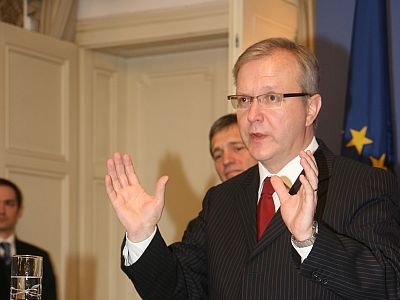 Olli Rehn said prospects to join the bloc helped to anchor political stability and economic reform in the Western Balkans.
Olli Rehn said prospects to join the bloc helped to anchor political stability and economic reform in the Western Balkans.
The European Union should not freeze plans to admit Western Balkan countries as members, the bloc’s enlargement chief said on Tuesday, responding to German doubts about the pace of expansion.
German Chancellor Angela Merkel said on Monday the 27-nation bloc needed a “consolidation phase” before it added new members.
Asked about the statement, EU Enlargement Commissioner Olli Rehn said prospects to join the bloc helped to anchor political stability and economic reform in the Western Balkans, a region torn by wars in the 1990s.
“We cannot take any sabbatical from our invaluable work for stability and … progress in the Western Balkans, which is essentially provided by a European perspective,” Rehn told a news conference.
“This is … an anchor of stability in southeastern Europe. We should not shake this anchor.”
Rehn said the economic crisis and efforts to ratify the EU’s Lisbon treaty on institutional reform should not be a distraction for the bloc’s enlargement efforts.
“The EU is able to handle several things at the same time,” he said. Rehn spoke after a meeting with foreign ministers from Slovenia and Croatia, which are locked in a border row that is blocking Zagreb’s EU entry talks.
Croatia hopes to wrap up EU accession talks this year and join the bloc in the next few years. But the goal is threatened by EU member Slovenia’s veto to further progress of the talks.
Rehn said he presented a compromise to the countries, which now needed to be studied.
“It is still work in progress. I don’t want to go into details regarding a possible agreement,” he said.
Slovenia, which joined the EU in 2004, wants direct access to international waters in the northern Adriatic, which would force Croatia to cede some waters it sees as its own. Four small villages are also contested.
 Eurasia Press & News
Eurasia Press & News
